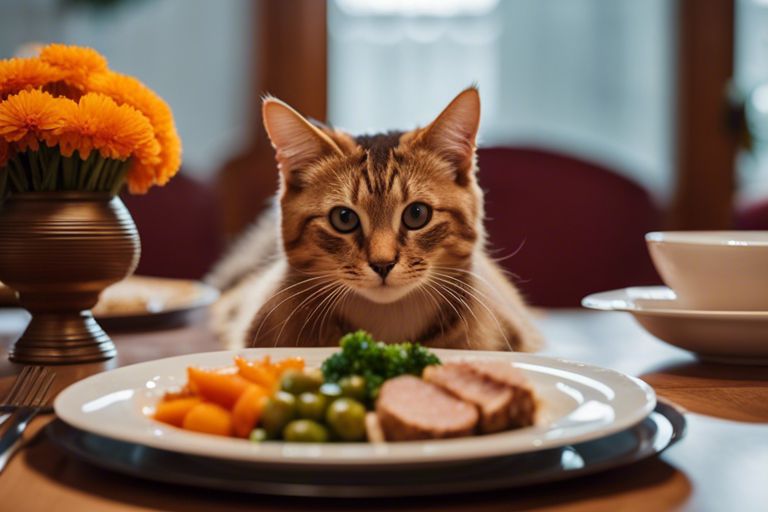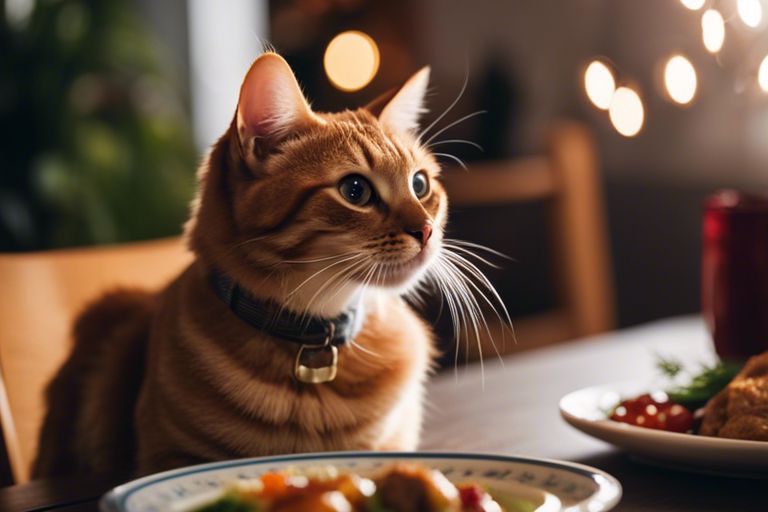Have you ever wondered if it’s safe to feed your feline friend some turkey? While it may seem harmless, there are important factors to consider when introducing turkey into a cat’s diet. Dark or white meat, bones, skin, and other additives can pose potential health risks to cats. However, when properly prepared and served in moderation, some turkey can provide nutritional benefits for cats. In this blog post, we will explore the safety of feeding turkey to your cats and provide important guidelines for incorporating it into their diet.

Nutritional Aspects of Turkey for Cats
If you’re considering adding turkey to your cat’s diet, it’s important to understand the nutritional aspects of this meat. Turkey can be a great addition to your cat’s diet, but it’s important to ensure it is fed in the right way.
Protein Content in Turkey
Nutritional the most important aspect of turkey for cats is its high protein content. Cats are obligate carnivores, which means they require a diet high in protein to meet their nutritional needs. Turkey is an excellent source of high-quality protein, which is essential for your cat’s overall health and well-being. Protein is vital for your cat’s muscle growth, maintenance, and overall body function.
Essential Nutrients Found in Turkey
To ensure your cat’s diet is well-rounded and complete, it’s important to consider the essential nutrients found in turkey. Turkey is rich in essential nutrients such as vitamin B6, niacin, zinc, and phosphorus, which are all crucial for maintaining your cat’s overall health.
Content of these essential nutrients helps support your cat’s immune system, promote healthy skin and coat, and contribute to their overall well-being. As always, it’s important to ensure that turkey is fed in moderation and as part of a balanced diet.
Potential Risks and Considerations
One of the main concerns when feeding turkey to your cat is the potential for health risks. While cats can eat turkey, there are certain considerations to keep in mind to ensure their safety and well-being. Before introducing any new food into your cat’s diet, it’s essential to understand the potential risks and make informed decisions. For more information on whether cats can eat turkey, check out this article.
Turkey Bones and Choking Hazards
For cats, turkey bones can pose a significant choking hazard and risk of injury. It’s crucial to avoid feeding cooked turkey bones to cats, as they can splinter and cause damage to the digestive tract or become lodged in their throat. If you do choose to feed your cat turkey, ensure that it is boneless and free of any small bones that could pose a danger.
Additionally, always supervise your cat while they are consuming turkey to prevent any choking incidents or other potential hazards associated with consuming bones.
Seasonings and Ingredients to Avoid
Considerations should also be made regarding the seasonings and ingredients used in preparing the turkey. Certain spices, such as garlic and onion, can be toxic to cats and should be avoided at all costs. It’s important to ensure that the turkey is plain and free from any potentially harmful seasonings or ingredients.
Bones, gravy, and stuffing are other items commonly associated with turkey that should be avoided, as they can contain ingredients that are harmful to cats or pose a choking hazard.

Safe Ways to Feed Turkey to Your Cat
Your cat may enjoy a bit of turkey in their diet, but it’s important to do so in a safe and responsible manner. By following these guidelines, you can ensure that your feline friend can enjoy turkey without any harm to their health.
Recommended Portions and Frequency
Any turkey given to your cat should be boneless, skinless, and cooked. Serve small portions of plain turkey, and limit it to occasional treats rather than a regular part of their diet. A good rule of thumb is to feed your cat turkey no more than a few times a week, in small amounts.
Preparation Tips for Turkey
Any turkey given to your cat should be free from seasoning, including onion, garlic, and salt. When preparing the turkey, ensure that it is lean and thoroughly cooked. Cut the turkey into small, manageable pieces for your cat to prevent choking hazards. Knowing how to properly prepare the turkey for your cat’s consumption is crucial in providing a safe and enjoyable experience for them.
Recommended tips for preparing turkey for your cat include ensuring it is boneless, skinless, and cooked. It’s also important to avoid seasoning, such as onion, garlic, and salt, as they can be harmful to your cat’s health. Knowing how to properly prepare the turkey will ensure a safe and enjoyable experience for your furry friend.

Is Pumpkin Safe for Cats to Eat, Similar to Turkey?
Yes, cats can eat pumpkin in moderation, just like they can eat turkey. Pumpkin is actually beneficial for their digestion and can help with hairballs. However, it’s important to ensure that the pumpkin is cooked and plain, without any added sugars or spices that could be harmful to cats.
Alternatives to Turkey in a Cat’s Diet
Not all cats are fans of turkey, and some may have dietary restrictions that prevent them from consuming it. Fortunately, there are plenty of alternatives to turkey that can provide your cat with the protein and nutrients they need to thrive.
Other Safe Protein Sources
An important source of protein for cats is chicken or beef, which are both easily digestible and high in essential amino acids. Fish, such as salmon or tuna, can also be a good source of protein for cats, but be cautious of high levels of mercury in certain types of fish. Always ensure that any protein sources are cooked thoroughly and free from any seasoning or additives.
Balancing Your Cat’s Diet with Variety
Sources of variety in your cat’s diet can include a mix of protein sources, such as rotating between chicken, beef, and fish. This can help prevent your cat from developing dietary sensitivities and deficiencies. Other options for adding variety include introducing small amounts of fruits and vegetables, such as blueberries or carrots, as occasional treats.
Other factors to consider when balancing your cat’s diet with variety include consulting with a veterinarian to ensure that their nutritional needs are being met, and being mindful of any food allergies or sensitivities that your cat may have.
FAQ
Can cats eat turkey?
Yes, cats can safely eat turkey. When properly cooked and prepared, turkey can be a healthy addition to your cat’s diet. However, it’s important to remove all bones and skin before feeding it to your cat to prevent any potential choking hazards or digestive issues.
Is turkey safe for my cats to eat?
Yes, turkey is generally safe for cats to eat. It is a good source of protein and can provide essential nutrients for your cat’s overall health. Just be sure to feed your cat plain, cooked turkey without any seasonings, marinades, or additives that could be harmful to their digestive system.
Are there any potential risks of feeding turkey to my cats?
While turkey can be a safe and tasty treat for your cat, there are some potential risks to be aware of. Raw or undercooked turkey can contain harmful bacteria such as salmonella or E. coli, so it’s crucial to always cook the meat thoroughly before offering it to your cat. Additionally, as mentioned earlier, bones and skin should be removed to prevent any choking hazards or gastrointestinal blockages.

Hello there, I am Iftekhar Ahmed. I am the owner of Mishka & The Cat Corners. I love to explore and write on various topics about cats

